Serendip is an independent site partnering with faculty at multiple colleges and universities around the world. Happy exploring!
Notes Towards Day 9: The Art of Reading--"with no place of repose"?

I. Coursekeeping
finish up the task of naming one another...
jrlewis as notetaker
keep on reading-->aim to complete 3/4 of
Portrait (through Chapter 42) for Wednesday
(Who is reading online? Google Books? Project
Gutenberg? --a report about using this platform?)
We're continuing to "work" the question we raised, last week,
about what it means to view a portrait, as opposed to reading one.
What do you see in this sequence?

"Portrait of a Lady (Mrs. Heymann?)" (1894)
![]()
"Portrait of a Lady" (1897)
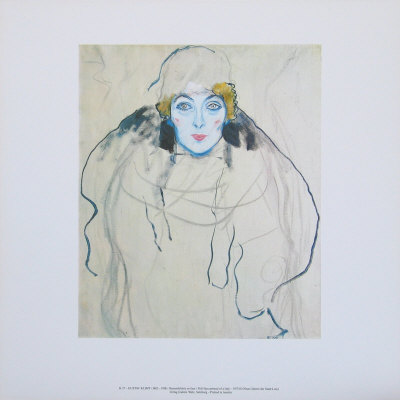
"Full-Face Portrait of a Lady" (c.1917)
![]()
"Portrait of a Lady" (1917-18)
![]()
"Portrait of a Lady" (1917-18)
What can we "tell" about any of these ladies?
What do we know of who they are?
What do their exteriors tell us of their interiors?
All of these portraits were painted by Gustav Klimt, whose 'mature works are characterized by a rejection of earlier naturalistic styles, and make use of symbols or symbolic elements to convey psychological ideas and emphasize the "freedom" of art from traditional culture.'
 1894 |
1918 |
Klimt was living and painting a generation
after James was living and writing
(The Portrait of a Lady was first
published, serially, in 1880.)
|
|
|
Let's put their work in conversation with one another.
Our art historian weighs in-->
kkazan on written portraits: We, as spectators, know what to do with these portraits. There is little room for interpretation, and, as the genre tells us, these are what the sitter looked like. We gain a clear visual idea of what these individuals look like.
Unlike painted portraits, written portraits leave much room for interpretation, and cannot be fully trusted. The reader cannot be sure the author is 'painting' with words is the true image of the subject. Not only can we not be sure the subject is accurately portrayed, we cannot be sure the image it creates in our minds is the image the author was seeing. Words leave much up to interpretation, paint, generally does not.
But cf. also Fabelhaft, on "Walking on Broken Glass",
in which relationships are convoluted and twisted....
and Calamity's a Portrait of a Lady is not quite "the Real Thing":
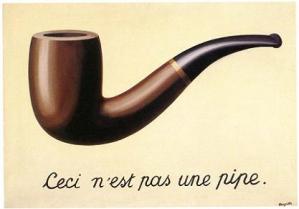 |
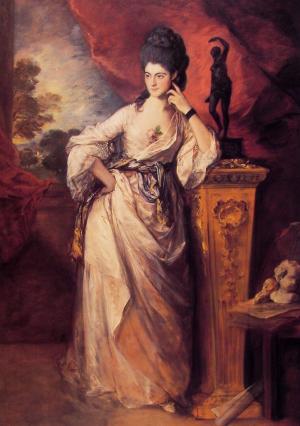 |
??????????????????????????????????????????????????????????????????????????
Cf. Mark Desiderio, "The Art of Friction: Henry James's Evasion
of the Pictorial." The Henry James Review 23 (2002): 273-282:
the critics of Henry James...find in the world of visual art an assortment of metaphors with which to account for...idiosyncrasies of style, innovations in narrative technique, and principles of composition....this manner of reading James...has always struck me as a too convenient way of coming to grips with one of literature's most notoriously intractable narrative styles. It allays, I think, a persistent anxiety on the part of readers towards all there is in James (and there is plenty) that is elaborately, aggressively discursive and abstract; it is a defense against the perceptual distress...that comes of the mind's eyes having no object to fix upon, no place of repose....the attempts to get at James through a rhetoric of the pictorial...would do well to recall...the frustrated William comically grasping at a way to characterize Henry's "method of narration by interminable elaboration of suggestive reference."
What instructions for interpretation does
James give us for reading his portrait(s)?
Laurel Bollinger, "The ethics of reading: The struggle for subjectivity in The Portrait of a Lady." Criticism 44, 2 (Spring 2002) 139-161:
When she tells a shocked Henrietta Stackpole that her husband cannot read, the Countess Gemini becomes an almost comic instance of what by this point has become a recurrent pattern in James' The Portrait of a Lady: women figured in terms of written language, but bound to men unable--or unwilling--to "read" them.
James tropes extensively upon textuality and reading, constructing "being read" and 'being misread" as conditions of varying moral import, especially for women.
[He also tropes on what it means, as a man or a woman, to read the world.]
Chapter 5, Ralph: "Living as he now lived was like reading a good book in a poor translation--a meagre entertainment for a young man who felt that he might have been an excellent linguist."
Chapter 24, p. 233: Pansy was so formed and finished....She was like a sheet of blank paper--the ideal jeune fille of foreign fiction. Isabel hoped that so fair and smooth a page would be covered with an edifying text.... the Countess was quite another affair. She was by no means a blank sheet; she had been written over in a variety of hands, and Mrs. Touchett...pronounced that a number of unmistakeable blots were to be seen upon her surface.
Isabel continually juggles her position as character and as reader:
Chapter 12, on the occasion of Lord Warburton's proposal: "It suddenly came upon her that her situation was one which a few weeks ago she would have deemed deeply romantic: the park of an old English country-house, with the foreground embellished by a "great" (as she supposed) nobleman in the act of making love to a young lady who, on careful inspection, should be found to present remarkable analogies with herself. But if she was now the heroine of the situation she succeeded scarcely the less in looking at it from the outside."
Bollinger argues that "Isabel permits her limited ability to read texts
to govern her capacity to interpret and to experience real situations."
What do we think of this claim?
What do we know of Isabel's tastes and skills as a reader?
What do we know of her character that might affect how she reads?
(What do you know of reader-response theory?)
How useful is the skill of reading texts, in reading life?
How transferable (do you think) is your knowledge?
From the Faculty Learning Community: "intuitive expectations about how
our students will generalize and apply their learning might be incorrect."
Chapter 42: "She had had a more wondrous vision of him, fed through
charmed senses and oh such a stirred fancy!-she had not read him right."
She's smart; why did/will she misread (him)?
Of course he also misreads her: why?
Bollinger argues that her concealment leaves him "with an incomplete text to
decipher....Isabel thus becomes complicit in Osmond's misinterpretation of her."
Does the novel suggest that she should
have made herself more transparent?
What kind(s) of speaking and reading does this book advocate?
What sorts does it illustrate?
Cf. Mrs. Touchett, Ch. 5: "I never know what I mean in my telegrams--
especially those I send from America. Clearness is too expensive."
Also Ch. 25, p. 230: "... his mother... looked at him as if he had been dancing a jig. He had such a fanciful, pictorial way of saying things that he might as well address her in the deaf-mute's alphabet. 'I don't think I know what you mean,' she said; 'you use too many figures of speech; I could never understand allegories. The two words in the language I most respect are Yes and No.'"
Cf. to Mrs. Touchett's preferable for non-figural speech,
Madame Merle's well-known (infamous!) insistence that
the visible is interpretable as an expression of the self.
Cf. also Isabel's adamant rejection of this idea:
Chapter 19, pp. 172-173:
"I don't care anything about his house," said Isabel.
"That's very crude of you. When you've lived as long as I you'll see that every human being has his shell and that you must take the shell into account. By the shell I mean the whole envelope of circumstances. There's no such thing as an isolated man or woman; we're each of us made up of some cluster of appurtenances. What shall we call our 'self'? Where does it begin? where does it end? It overflows into everything that belongs to us--and then it flows back again. I know a large part of myself is in the clothes I choose to wear. I've a great respect for things! One's self--for other people--is one's expression of one's self; and one's house, one's furniture, one's garments, the books one reads, the company one keeps--these things are all expressive."
.... "I don't agree with you. I think just the other way. I don't know whether I succeed in expressing myself, but I know that nothing else expresses me. Nothing that belongs to me is any measure of me; everything's on the contrary a limit, a barrier, and a perfectly arbitrary one. Certainly the clothes which, as you say, I choose to wear, don't express me; and heaven forbid they should!....they're imposed upon me by society."
"Should you prefer to go without them?" Madame Merle enquired in a tone which virtually terminated the discussion.
What alternatives does the novel offer,
to the virtual wordlessness of Mrs. Touchett,
and the pure representation of Madame Merle?
What advice is it giving us, both about
reading the word and reading the world?
____________
Additional Reading Notes
Ch. 17, p. 144: ""Do you know where you're going, Isabel Archer?...."Do you know where you're drifting?" Henrietta pursued...."No, I haven't the least idea, and I find it very pleasant not to know. A swift carriage, of a dark night, rattling with four horses over roads that one can't see--that's my idea of happiness"...like the heroine of an immoral novel," said Miss Stackpole. "You're drifting to some great mistake."
Chapter 18, p. 158: "I should like to make her rich." "What do you mean by rich?" "I call people rich when they're able to meet the requirements of their imagination. Isabel has a great deal of imagination."
Chapter 19, p. 164: "That's the great thing," Isabel solemnly pondered; "that's the supreme good fortune: to be in a better position for appreciating people than they are for appreciating you." And she added that such, when one considered it, was simply the essence of the aristocratic situation. In this light, if in none other, one should aim at the aristocratic situation.
p. 165: [Madame Merle's] nature had been too much overlaid by custom and her angles too much rubbed away. She had become too flexible, too useful, was too ripe and too final. She was in a word too perfectly the social animal that man and woman are supposed to have been intended to be; and she had rid herself of every remnant of that tonic wildness which we may assume to have belonged even to the most amiable persons in the ages before country-house life was the fashion. Isabel found it difficult to think of her in any detachment or privacy, she existed only in her relations, direct or indirect, with her fellow mortals. One might wonder what commerce she could possibly hold with her own spirit.
p. 166: "It's very true; there are many more iron pots certainly than porcelain. But you may depend on it that every one bears some mark; even the hardest iron pots have a little bruise, a little hole somewhere. I flatter myself that I'm rather stout, but if I must tell you the truth I've been shockingly chipped and cracked. I do very well for service yet, because I've been cleverly mended; and I try to remain in the cupboard--the quiet, dusky cupboard where there's an odour of stale spices--as much as I can. But when I've to come out and into a strong light--then, my dear, I'm a horror!"
p. 168: "I belong to the old, old world.... You should live in your own land; whatever it may be you have your natural place there....we've no natural place here. We're mere parasites, crawling over the surface; we haven't our feet in the soil....A woman perhaps can get on; a woman, it seems to me, has no natural place anywhere; wherever she finds herself she has to remain on the surface and, more or less, to crawl.
p. 169: No career, no name, no position, no fortune, no past, no future, no anything...."oh, I do nothing....." If it were a career to be an excellent father he'd be very distinguished.
p. 170: these reflections are presented in a cluster for the convenience of the reader.
"It's an antipathy of nature....Justice is all I want."
p. 171: With all her love of knowledge she had a natural shrinking from raising curtains and looking into unlighted corners. The love of knowledge coexisted in her mind with the finest capacity for ignorance.
"And your ambitions have not been satisfied? They must have been great." "They were great.
p. 172: "What's your idea of success?" "....It's to see some dream of one's youth come true." "Ah," Madame Merle exclaimed, "that I've never seen! But my dreams were so great--so preposterous. Heaven forgive me, I'm dreaming now!"... she said to Isabel that her definition of success had been very pretty, yet frightfully sad. Measured in that way, who had succeeded? The dreams of one's youth, why they were enchanting, they were divine! Who had ever seen such things come to pass?
p. 173: I am bound to confess....
Ch. 20, p. 184 (Ned Rosier): You think I ought to do something, and so do I, so long as you leave it vague. But when you come to the point you see you have to stop. I can't go home and be a shopkeeper..... I can't sell....Ah no; I couldn't be a shopkeeper. I can't be a doctor; it's a repulsive business. I can't be a clergyman; I haven't got convictions.....I can't be a lawyer; I don't understand- how do you call it?--the American procedure. Is there anything else? There's nothing for a gentleman in America."
p. 185: "The peril for you is that you live too much in the world of your own dreams. You're not enough in contact with reality- with the toiling, striving, suffering, I may even say sinning, world that surrounds you. You're too fastidious; you've too many graceful illusions. Your newly-acquired thousands will shut you up more and more to the society of a few selfish and heartless people who will be interested in keeping them up....you think you can lead a romantic life, that you can live by pleasing yourself and pleasing others. You'll find you're mistaken. Whatever life you lead you must put your soul in it--to make any sort of success of it; and from the moment you do that it ceases to be romance, I assure you: it becomes grim reality! And you can't always please yourself; you must sometimes please other people. That, I admit, you're very ready to do; but there's another thing that's still more important--you must often displease others. You must always be ready for that--you must never shrink from it. That doesn't suit you at all--you're too fond of admiration, you like to be thought well of. You think we can escape disagreeable duties by taking romantic views--that's your great illusion, my dear. But we can't. You must be prepared on many occasions in life to please no one at all--not even yourself."
Ch. 21, p. 187: in spite of eccentric impulses, she had a great regard for what was usually deemed decent, and a young gentlewoman without visible relations had always struck her as a flower without foliage.
p. 188: Isabel came at last to have a kind of undemonstrable pity for her; there seemed something so dreary in the condition of a person whose nature had, as it were, so little surface--offered so limited a face to the accretions of human contact. Nothing tender, nothing sympathetic, had ever had a chance to fasten upon it--no wind-sown blossom, no familiar softening moss. Her offered, her passive extent, in other words, was about that of a knife-edge.
p. 189: "Take things more easily. Don't ask yourself so much whether this or that is good for you. Don't question your conscience so much--it will get out of tune like a strummed piano. Keep it for great occasions. Don't try so much to form your character--it's like trying to pull open a tight, tender young rose. Live as you like best, and your character will take care of itself. Most things are good for you....You've too much power of thought--above all too much conscience," Ralph added. "It's out of all reason, the number of things you think wrong. Put back your watch. Diet your fever. Spread your wings; rise above the ground. It's never wrong to do that."
...."I'm absorbed in myself--I look at life too much as a doctor's prescription. Why indeed should we perpetually be thinking whether things are good for us, as if we were patients lying in a hospital? Why should I be so afraid of not doing right? As if it mattered to the world whether I do right or wrong!"
Ch. 22, p. 192:...this antique, solid, weather-worn, yet imposing front had a somewhat incommunicative character. It was the mask, not the face of the house. It had heavy lids, but no eyes; the house in reality looked another way--looked off behind, into splendid openness and the range of the afternoon light....The windows of the ground-floor...were, in their noble proportions, extremely architectural; but their function seemed less to offer communication with the world than to defy the world to look in.
p. 199: She was evidently impregnated with the idea of submission, which was due to any one who took the tone of authority; and she was a passive spectator of the operation of her fate.
Ch. 23, p. 207: "You ought to see a great many men," Madame Merle remarked; "you ought to see as many as possible, so as to get used to them." "Used to them?" Isabel repeated with that solemn stare which sometimes seemed to proclaim her deficient in the sense of comedy. "Why, I'm not afraid of them--I'm as used to them as the cook to the butcher-boys." "Used to them, I mean, so as to despise them...." This was a note of cynicism that Madame Merle didn't often allow herself to sound....
p. 212: On the character of every one else you may find some little black speck; if I were to take half an hour to it, some day, I've no doubt I should be able to find one on yours. For my own, of course, I'm spotted like a leopard. But on Madame Merle's nothing, nothing, nothing!"....He was sure she had been yearningly ambitious and that what she had visibly accomplished was far below her secret measure.
Ch. 24, p. 215: Isabel made a rapid induction: perfect simplicity was not the badge of his family....even Mr. Osmond's diminutive daughter had a kind of finish that was not entirely artless.
p. 216 (the Countess): "I don't want to know anything more....The more you know the more unhappy you are....one shouldn't attempt to reason it out--you never know where it may lead you. There are some very good feelings that may have bad reasons, don't you know? And then there are very bad feelings, sometimes, that have good reasons."
p. 219-220: He resembled no one she had ever seen; most of the people she knew might be divided into groups of half a dozen specimens....Her mind contained no class offering a natural place to Mr. Osmond--he was a specimen apart....Ralph had something of this same quality, this appearance of thinking that life was a matter of connoisseurship....
p. 222: "I'm rather ashamed of my plans; I make a new one every day....It seems frivolous, I think," said Isabel. "One ought to choose something very deliberately, and be faithful to that."
Ch. 25, p. 228: "Who is he, if you please? What has he ever done?...there's nothing, nothing, nothing."
p. 234: As she liked the brother Isabel thought it proper to try and like the sister: in spite of the growing complexity of things she was still capable of these primitive sequences.
p. 237: in foreign lands, as she ingeniously remarked, one seemed to see the right side of the tapestry; out of doors in England one seemed to see the wrong side, which gave one no notion of the figure. The admission costs her historian a pang, but Henrietta, despairing of more occult things, was now paying much attention to the outer life.
p. 239: "You're unfathomable," she murmured at last. "I'm frightened at the abyss into which I shall have cast her."

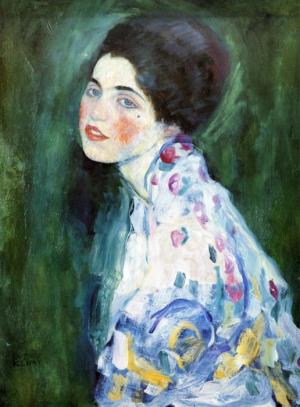
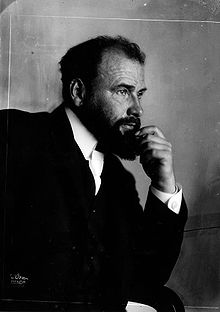
296c.jpg)

